
List of United States Senators from Iowa
Encyclopedia
Iowa
was admitted to the Union on December 28, 1846. Its current Senators are Republican Charles Grassley, who has served since 1981, and Democrat Tom Harkin
, who has served since 1985.
Iowa
Iowa is a state located in the Midwestern United States, an area often referred to as the "American Heartland". It derives its name from the Ioway people, one of the many American Indian tribes that occupied the state at the time of European exploration. Iowa was a part of the French colony of New...
was admitted to the Union on December 28, 1846. Its current Senators are Republican Charles Grassley, who has served since 1981, and Democrat Tom Harkin
Tom Harkin
Thomas Richard "Tom" Harkin is the junior United States Senator from Iowa and a member of the Democratic Party. He previously served in the United States House of Representatives ....
, who has served since 1985.
Class 2
| # | Senator | Party | Years | Term | Electoral history |
|---|---|---|---|---|---|
| 1 | 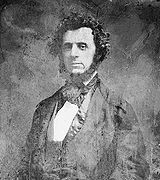 George W. Jones George W. JonesGeorge W. Jones George Wallace Jones , a frontiersman, entrepreneur, attorney, and judge, was among the first two United States Senators to represent the state of Iowa after it was admitted to the Union in 1846... |
Democratic Democratic Party (United States) The Democratic Party is one of two major contemporary political parties in the United States, along with the Republican Party. The party's socially liberal and progressive platform is largely considered center-left in the U.S. political spectrum. The party has the lengthiest record of continuous... |
December 7, 1848 – March 4, 1859 |
1 | Elected in 1848 United States Senate elections, 1848 The United States Senate election of 1848 was an election which had the Whig Party gain four seats in the United States Senate.As this election was prior to ratification of the seventeenth amendment, Senators were chosen by State legislatures.... |
| 2 | Re-elected in 1853 Lost renomination |
||||
| 2 | 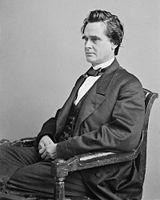 James W. Grimes James W. GrimesJames W. Grimes James Wilson Grimes was an American politician, serving as the third Governor of Iowa and a United States Senator from Iowa.-Biography:... |
Republican Republican Party (United States) The Republican Party is one of the two major contemporary political parties in the United States, along with the Democratic Party. Founded by anti-slavery expansion activists in 1854, it is often called the GOP . The party's platform generally reflects American conservatism in the U.S... |
March 4, 1859 – December 6, 1869 |
3 | Elected in 1859 |
| 4 | Re-elected in 1865 Resigned due to ill health |
||||
| Vacant | December 6, 1869 – January 18, 1870 |
||||
| 3 | James B. Howell James B. Howell James Bruen Howell was a United States Senator from Iowa for slightly over one year.Born near Morristown, New Jersey, he moved with his parents to Newark, Ohio, in 1819, and attended the public schools. He graduated from Miami University in 1839, studied law, and was admitted to the bar in 1839,... |
Republican Republican Party (United States) The Republican Party is one of the two major contemporary political parties in the United States, along with the Democratic Party. Founded by anti-slavery expansion activists in 1854, it is often called the GOP . The party's platform generally reflects American conservatism in the U.S... |
January 18, 1870 – March 4, 1871 |
Elected to finish Grimes's term Retired |
|
| 4 | George G. Wright George G. Wright George Grover Wright was a pioneer lawyer, Iowa Supreme Court justice, law professor, and Republican United States Senator from Iowa.... |
Republican Republican Party (United States) The Republican Party is one of the two major contemporary political parties in the United States, along with the Democratic Party. Founded by anti-slavery expansion activists in 1854, it is often called the GOP . The party's platform generally reflects American conservatism in the U.S... |
March 4, 1871 – March 4, 1877 |
5 | Elected in 1870 United States Senate elections, 1870 The United States Senate election of 1870 was an election which had the Republican Party relinquish six seats in the United States Senate, though still retain an overwhelming majority.... Retired |
| 5 | 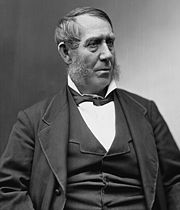 Samuel J. Kirkwood Samuel J. KirkwoodSamuel J. Kirkwood Samuel Jordan Kirkwood , was an American politician best known as Iowa's American Civil War Governor. He also served in the U.S. Senate and as U.S. Secretary of the Interior.-Early life and career:... |
Republican Republican Party (United States) The Republican Party is one of the two major contemporary political parties in the United States, along with the Democratic Party. Founded by anti-slavery expansion activists in 1854, it is often called the GOP . The party's platform generally reflects American conservatism in the U.S... |
March 4, 1877 – March 7, 1881 |
6 | Elected in 1876 United States Senate elections, 1876 The United States Senate election of 1876 was an election which had the Democratic Party gain three seats in the United States Senate, and which coincided with Rutherford B... Resigned to become U.S. Secretary of the Interior United States Secretary of the Interior The United States Secretary of the Interior is the head of the United States Department of the Interior.The US Department of the Interior should not be confused with the concept of Ministries of the Interior as used in other countries... |
| 6 | 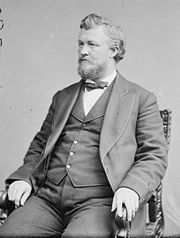 James W. McDill James W. McDillJames W. McDill James Wilson McDill was a lawyer, state-court judge, Republican United States Representative and Senator from Iowa, state railroad commissioner, and member of the Interstate Commerce Commission.... |
Republican Republican Party (United States) The Republican Party is one of the two major contemporary political parties in the United States, along with the Democratic Party. Founded by anti-slavery expansion activists in 1854, it is often called the GOP . The party's platform generally reflects American conservatism in the U.S... |
March 8, 1881 – March 4, 1883 |
Appointed to continue Kirkwood's term Elected to finish Kirkwood's term Retired |
|
| 7 | James F. Wilson | Republican Republican Party (United States) The Republican Party is one of the two major contemporary political parties in the United States, along with the Democratic Party. Founded by anti-slavery expansion activists in 1854, it is often called the GOP . The party's platform generally reflects American conservatism in the U.S... |
March 4, 1883 – March 4, 1895 |
7 | Elected in 1882 United States Senate elections, 1882 The United States Senate election of 1882 was an election which had the Republican Party obtain an outright majority in the United States Senate.... |
| 8 | Re-elected in 1888 United States Senate elections, 1888 The United States Senate election of 1888 was an election which, coinciding with Benjamin Harrison's victory over incumbent President Grover Cleveland, had the Republican Party gain twelve seats in the United States Senate, mostly from newly-admitted States.... Retired |
||||
| 8 | 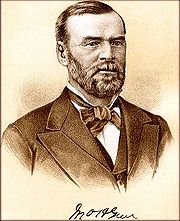 John H. Gear John H. GearJohn H. Gear John Henry Gear was the 11th Governor of Iowa, United States Representative, and Senator.-Biography:Born in Ithaca, New York, he attended the common schools and moved to Galena, Illinois in 1836, to Fort Snelling, Iowa, in 1838, and to Burlington in 1843, where he engaged in mercantile pursuits... |
Republican Republican Party (United States) The Republican Party is one of the two major contemporary political parties in the United States, along with the Democratic Party. Founded by anti-slavery expansion activists in 1854, it is often called the GOP . The party's platform generally reflects American conservatism in the U.S... |
March 4, 1895 – July 14, 1900 |
9 | Elected in 1894 Died |
| Vacant | July 14, 1900 – August 22, 1900 |
||||
| 9 | Jonathan P. Dolliver Jonathan P. Dolliver Jonathan Prentiss Dolliver was a Republican orator, U.S. Representative, then U.S. Senator from Iowa at the turn of the 20th century... |
Republican Republican Party (United States) The Republican Party is one of the two major contemporary political parties in the United States, along with the Democratic Party. Founded by anti-slavery expansion activists in 1854, it is often called the GOP . The party's platform generally reflects American conservatism in the U.S... |
August 22, 1900 – October 15, 1910 |
Appointed to finish Gear's term | |
| 10 | Elected to full term in 1900 United States Senate elections, 1900 The United States Senate election of 1900 was an election which had the Republican Party gain three seats in the United States Senate, and which corresponded with President William McKinley's landslide re-election.... |
||||
| 11 | Re-elected in 1906 United States Senate elections, 1906 The United States Senate election of 1906 was an election which had the Republican Party gain three seats in the United States Senate, expanding their majority to almost twice that of the opposing Democratic Party.... Died |
||||
| Vacant | October 15, 1910 – November 12, 1910 |
||||
| 10 | 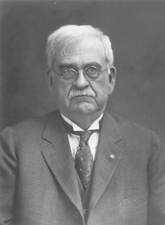 Lafayette Young Lafayette YoungLafayette Young Lafayette Young was a newspaper reporter and editor, and a Republican Senator from Iowa.Young was born in Monroe County, Iowa. His early education was acquired in the public schools and in printing offices at Albia, Iowa and Des Moines, Iowa... |
Republican Republican Party (United States) The Republican Party is one of the two major contemporary political parties in the United States, along with the Democratic Party. Founded by anti-slavery expansion activists in 1854, it is often called the GOP . The party's platform generally reflects American conservatism in the U.S... |
November 12, 1910 – April 11, 1911 |
Appointed to continue Dolliver's term Lost election to finish Dolliver's term |
|
| 11 | 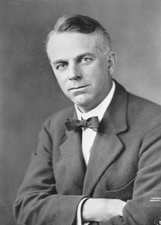 William S. Kenyon William S. Kenyon |
Republican Republican Party (United States) The Republican Party is one of the two major contemporary political parties in the United States, along with the Democratic Party. Founded by anti-slavery expansion activists in 1854, it is often called the GOP . The party's platform generally reflects American conservatism in the U.S... |
April 12, 1911 – February 24, 1922 |
Elected to finish Dolliver's term | |
| 12 | Re-elected in 1912 | ||||
| 13 | Re-elected in 1918 Resigned to become Judge of the U.S. Court of Appeals United States Court of Appeals for the Eighth Circuit The United States Court of Appeals for the Eighth Circuit is a federal court with appellate jurisdiction over the district courts in the following districts:* Eastern District of Arkansas* Western District of Arkansas... |
||||
| 12 | Charles A. Rawson Charles A. Rawson Charles Augustus Rawson was an unelected United States Senator from Iowa for nine months in 1922.Born in Des Moines, he attended the public schools and Grinnell College. He engaged in banking and the insurance business and also in the manufacture of clay products, and was a member of the board of... |
Republican Republican Party (United States) The Republican Party is one of the two major contemporary political parties in the United States, along with the Democratic Party. Founded by anti-slavery expansion activists in 1854, it is often called the GOP . The party's platform generally reflects American conservatism in the U.S... |
February 24, 1922 – December 1, 1922 |
Appointed to continue Kenyon's term Retired when successor elected |
|
| 13 | 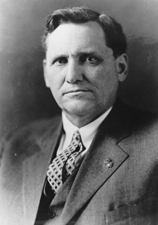 Smith W. Brookhart Smith W. BrookhartSmith W. Brookhart Smith Wildman Brookhart , was twice elected as a Republican to represent Iowa in the United States Senate. He was considered an "insurgent" within the Republican Party; his criticisms of the Harding and Coolidge Administrations and of business interests alienated others within the Republican... |
Republican Republican Party (United States) The Republican Party is one of the two major contemporary political parties in the United States, along with the Democratic Party. Founded by anti-slavery expansion activists in 1854, it is often called the GOP . The party's platform generally reflects American conservatism in the U.S... |
December 1, 1922 – April 12, 1926 |
Elected to finish Kenyon's term | |
| 14 | Re-elected in 1924 Lost election challenge |
||||
| 14 | Daniel F. Steck Daniel F. Steck Daniel Frederic Steck , was the only Iowa Democrat in the United States Senate between the American Civil War and the Great Depression. He was sworn in as Senator only after an extraordinary election challenge, in which his apparent defeat at the polls by a Progressive Party ally running as a... |
Democratic Democratic Party (United States) The Democratic Party is one of two major contemporary political parties in the United States, along with the Republican Party. The party's socially liberal and progressive platform is largely considered center-left in the U.S. political spectrum. The party has the lengthiest record of continuous... |
April 12, 1926 – March 4, 1931 |
Successfully challenged predecessor's election Lost re-election |
|
| 15 |  Lester J. Dickinson Lester J. DickinsonLester J. Dickinson Lester Jesse Dickinson was a Republican United States Representative and Senator from Iowa. He was, in the words of Time magazine, "a big, friendly, white-thatched Iowa lawyer." In early 1936 he dreamed of winning the presidency... |
Republican Republican Party (United States) The Republican Party is one of the two major contemporary political parties in the United States, along with the Democratic Party. Founded by anti-slavery expansion activists in 1854, it is often called the GOP . The party's platform generally reflects American conservatism in the U.S... |
March 4, 1931 – January 3, 1937 |
15 | Elected in 1930 Lost re-election |
| Vacant | January 3, 1937 – January 15, 1937 |
16 | Successor failed to qualify until term as Governor ended | ||
| 16 |  Clyde L. Herring Clyde L. HerringClyde L. Herring Clyde LaVerne Herring , an American politician and Democrat, served as the 26th Governor of Iowa, and then one of its U.S. Senators, during the last part of the Great Depression and the first part of World War II.... |
Democratic Democratic Party (United States) The Democratic Party is one of two major contemporary political parties in the United States, along with the Republican Party. The party's socially liberal and progressive platform is largely considered center-left in the U.S. political spectrum. The party has the lengthiest record of continuous... |
January 15, 1937 – January 3, 1943 |
Elected in 1936 Lost re-election |
|
| Vacant | January 3, 1943 – January 14, 1943 |
17 | |||
| 17 | 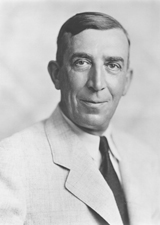 George A. Wilson George A. WilsonGeorge A. Wilson George Allison Wilson was a United States Senator and 28th Governor of Iowa.-Personal background:Born on a farm near Menlo, Iowa, Wilson attended rural schools, and Grinnell College in Grinnell, Iowa. He graduated from the University of Iowa College of Law at Iowa City in 1907, and was admitted to... |
Republican Republican Party (United States) The Republican Party is one of the two major contemporary political parties in the United States, along with the Democratic Party. Founded by anti-slavery expansion activists in 1854, it is often called the GOP . The party's platform generally reflects American conservatism in the U.S... |
January 14, 1943 – January 3, 1949 |
Elected in 1942 but waited to finish gubernatorial term Lost re-election |
|
| 18 | 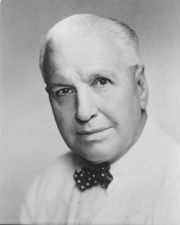 Guy Gillette Guy Gillette |
Democratic Democratic Party (United States) The Democratic Party is one of two major contemporary political parties in the United States, along with the Republican Party. The party's socially liberal and progressive platform is largely considered center-left in the U.S. political spectrum. The party has the lengthiest record of continuous... |
January 3, 1949 – January 3, 1955 |
18 | Elected in 1948 Lost re-election |
| 19 | 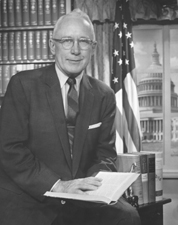 Thomas E. Martin Thomas E. MartinThomas E. Martin Thomas Ellsworth Martin was a United States Representative and Senator from Iowa. Martin, a Republican, served in Congress for 22 consecutive years, from January 1939 to January 1961.... |
Republican Republican Party (United States) The Republican Party is one of the two major contemporary political parties in the United States, along with the Democratic Party. Founded by anti-slavery expansion activists in 1854, it is often called the GOP . The party's platform generally reflects American conservatism in the U.S... |
January 3, 1955 – January 3, 1961 |
19 | Elected in 1954 Retired |
| 20 | 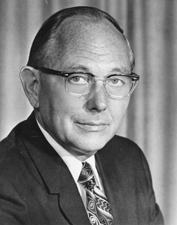 Jack Miller Jack Miller |
Republican Republican Party (United States) The Republican Party is one of the two major contemporary political parties in the United States, along with the Democratic Party. Founded by anti-slavery expansion activists in 1854, it is often called the GOP . The party's platform generally reflects American conservatism in the U.S... |
January 3, 1961 – January 3, 1973 |
20 | Elected in 1960 |
| 21 | Re-elected in 1966 Lost re-election |
||||
| 21 | 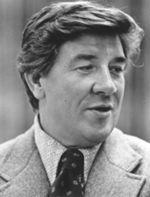 Dick Clark Dick ClarkDick Clark (senator) Richard Clarence "Dick" Clark represented the state of Iowa in the United States Senate from 1973 to 1979.Clark, a Democrat, was only successful in his first election for the Senate when he defeated Republican incumbent, Jack R. Miller in 1972. Clark received 662,637 votes to Miller's 530,525... |
Democratic Democratic Party (United States) The Democratic Party is one of two major contemporary political parties in the United States, along with the Republican Party. The party's socially liberal and progressive platform is largely considered center-left in the U.S. political spectrum. The party has the lengthiest record of continuous... |
January 3, 1973 – January 3, 1979 |
22 | Elected in 1972 Lost re-election |
| 22 | Roger Jepsen Roger Jepsen Roger William Jepsen is an American politician from the state of Iowa. A Republican, he served in the United States Senate.-Biography :... |
Republican Republican Party (United States) The Republican Party is one of the two major contemporary political parties in the United States, along with the Democratic Party. Founded by anti-slavery expansion activists in 1854, it is often called the GOP . The party's platform generally reflects American conservatism in the U.S... |
January 3, 1979 – January 3, 1985 |
23 | Elected in 1978 United States Senate elections, 1978 The United States Senate election of 1978 in the middle of Democratic President Jimmy Carter's term. The Democrats lost a net of three seats to the Republicans, leaving the balance of the chamber 58-41 in favor of the Democrats.... Lost re-election |
| 23 |  Tom Harkin Tom HarkinTom Harkin Thomas Richard "Tom" Harkin is the junior United States Senator from Iowa and a member of the Democratic Party. He previously served in the United States House of Representatives .... |
Democratic Democratic Party (United States) The Democratic Party is one of two major contemporary political parties in the United States, along with the Republican Party. The party's socially liberal and progressive platform is largely considered center-left in the U.S. political spectrum. The party has the lengthiest record of continuous... |
January 3, 1985 – Present |
24 | Elected in 1984 United States Senate election in Iowa, 1984 The 1984 United States Senate election in Iowa was held on November 5, 1984. Incumbent Republican U.S. Senator Roger Jepsen lost re-election to Tom Harkin.- Results :... |
| 25 | Re-elected in 1990 United States Senate election in Iowa, 1990 The 1990 United States Senate election in Iowa was held on November 5, 1990. Incumbent Democratic U.S. Senator Tom Harkin won re-election to a second term.- Republican :*Tom Tauke, U.S. Congressman from Iowa's 2nd congressional district... |
||||
| 26 | Re-elected in 1996 United States Senate election in Iowa, 1996 The 1996 United States Senate election in Iowa was held on November 5, 1996. Incumbent Democratic U.S. Senator Tom Harkin won re-election to a third term.- Results :... |
||||
| 27 | Re-elected in 2002 United States Senate election in Iowa, 2002 The 2002 United States Senate election in Iowa was held on November 5, 2002. Incumbent Democratic U.S. Senator Tom Harkin won re-election to a fourth term.- Results :... |
||||
| 28 | Re-elected in 2008 United States Senate election in Iowa, 2008 The 2008 United States Senate election in Iowa was held on November 4, 2008. Incumbent Democratic U.S. Senator Tom Harkin won re-election to a fifth term.-Results:-Candidates:* Christopher Reed - small businessman and Navy veteran... |
||||
| # | Senator | Party | Years | Term | Electoral history |
Class 3
| # | Senator | Party | Years | Term | Electoral history |
|---|---|---|---|---|---|
| 1 | 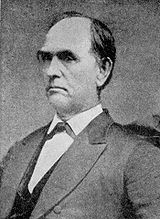 Augustus C. Dodge Augustus C. DodgeAugustus C. Dodge Augustus Caesar Dodge was one of the first set of United States Senators to represent the state of Iowa after it was admitted to the Union as a state in 1846. Dodge, a Democrat, had also represented Iowa Territory in Congress as its delegate to the U.S. House of Representatives from 1840 to... |
Democratic Democratic Party (United States) The Democratic Party is one of two major contemporary political parties in the United States, along with the Republican Party. The party's socially liberal and progressive platform is largely considered center-left in the U.S. political spectrum. The party has the lengthiest record of continuous... |
December 7, 1848 – February 22, 1855 |
1 | Elected in 1848 United States Senate elections, 1848 The United States Senate election of 1848 was an election which had the Whig Party gain four seats in the United States Senate.As this election was prior to ratification of the seventeenth amendment, Senators were chosen by State legislatures.... |
| 2 | Re-elected in 1849 Resigned to become U.S. Minister to Spain United States Ambassador to Spain -Ambassadors:*John Jay**Appointed: September 29, 1779**Title: Minister Plenipotentiary**Presented credentials:**Terminated mission: ~May 20, 1782*William Carmichael**Appointed: April 20, 1790**Title: Chargé d'Affaires... , having lost re-election |
||||
| Vacant | February 22, 1855 – March 4, 1855 |
||||
| 2 |  James Harlan James HarlanJames Harlan (senator) James Harlan was a member of the United States Senate and a U.S. Cabinet Secretary.-Biography:Harlan represented the state of Iowa in the United States Senate as a member of the Free Soil Party in 1855. In 1857 the Senate declared the seat vacant because of irregularities in the legislative... |
Free Soil Free Soil Party The Free Soil Party was a short-lived political party in the United States active in the 1848 and 1852 presidential elections, and in some state elections. It was a third party and a single-issue party that largely appealed to and drew its greatest strength from New York State. The party leadership... |
March 4, 1855 – January 5, 1957 |
3 | Elected in 1855 Elected invalidated, as the Iowa Senate Iowa Senate The Iowa Senate is the upper house of the Iowa General Assembly. There are 50 members of the Senate, representing 50 single-member districts across the state with populations of approximately 59,500 per constituency. Each Senate district is composed of two House districts... had not participated in it |
| Vacant | January 5, 1957 – January 29, 1857 |
||||
 James Harlan James HarlanJames Harlan (senator) James Harlan was a member of the United States Senate and a U.S. Cabinet Secretary.-Biography:Harlan represented the state of Iowa in the United States Senate as a member of the Free Soil Party in 1855. In 1857 the Senate declared the seat vacant because of irregularities in the legislative... |
Republican Republican Party (United States) The Republican Party is one of the two major contemporary political parties in the United States, along with the Democratic Party. Founded by anti-slavery expansion activists in 1854, it is often called the GOP . The party's platform generally reflects American conservatism in the U.S... |
January 29, 1857 – May 15, 1865 |
|||
| 4 | Re-elected in 1861 Resigned to become U.S. Secretary of the Interior United States Secretary of the Interior The United States Secretary of the Interior is the head of the United States Department of the Interior.The US Department of the Interior should not be confused with the concept of Ministries of the Interior as used in other countries... |
||||
| Vacant | May 15, 1865 – January 13, 1866 |
||||
| 3 |  Samuel J. Kirkwood Samuel J. KirkwoodSamuel J. Kirkwood Samuel Jordan Kirkwood , was an American politician best known as Iowa's American Civil War Governor. He also served in the U.S. Senate and as U.S. Secretary of the Interior.-Early life and career:... |
Republican Republican Party (United States) The Republican Party is one of the two major contemporary political parties in the United States, along with the Democratic Party. Founded by anti-slavery expansion activists in 1854, it is often called the GOP . The party's platform generally reflects American conservatism in the U.S... |
January 13, 1866 – March 4, 1867 |
Elected to finish Harlan's term Retired |
|
| 4 |  James Harlan James HarlanJames Harlan (senator) James Harlan was a member of the United States Senate and a U.S. Cabinet Secretary.-Biography:Harlan represented the state of Iowa in the United States Senate as a member of the Free Soil Party in 1855. In 1857 the Senate declared the seat vacant because of irregularities in the legislative... |
Republican Republican Party (United States) The Republican Party is one of the two major contemporary political parties in the United States, along with the Democratic Party. Founded by anti-slavery expansion activists in 1854, it is often called the GOP . The party's platform generally reflects American conservatism in the U.S... |
March 4, 1867 – March 4, 1873 |
5 | Elected in 1867 Lost re-election |
| 5 | William B. Allison William B. Allison William Boyd Allison was an early leader of the Iowa Republican Party, who represented northeastern Iowa for four consecutive terms in the U.S. House before representing his state for six consecutive terms in the U.S. Senate... |
Republican Republican Party (United States) The Republican Party is one of the two major contemporary political parties in the United States, along with the Democratic Party. Founded by anti-slavery expansion activists in 1854, it is often called the GOP . The party's platform generally reflects American conservatism in the U.S... |
March 4, 1873 – August 4, 1908 |
6 | Elected in 1872 United States Senate elections, 1872 The United States Senate election of 1872 was an election which had the Republican Party, while still retaining a commanding majority, lose nine seats in the United States Senate, mostly as defections to the Liberal Republican Party. It also coincided with President Ulysses S... |
| 7 | Re-elected in 1878 United States Senate elections, 1878 The United States Senate election of 1878 was an election which had the Democratic Party retake control of the United States Senate for the first time since before the Civil War.... |
||||
| 8 | Re-elected in 1884 United States Senate elections, 1884 The United States Senate election of 1884 was an election which had the Republican Party gain four seats in the United States Senate, and which coincided with the presidential election of 1884.... |
||||
| 9 | Re-elected in 1890 United States Senate elections, 1890 The United States Senate election of 1890 was an election which had the Republican Party lose two seats in the United States Senate, though still retain a commanding majority.... |
||||
| 10 | Re-elected in 1896 United States Senate elections, 1896 The United States Senate election of 1896 was an election which had the Democratic Party lose six seats in the United States Senate, mostly to minor third parties.... |
||||
| 11 | Re-elected in 1902 United States Senate elections, 1902 The United States Senate election of 1902 was an election which had the Republican Party and the Democratic Party each gain one seat in the United States Senate.... Died |
||||
| Vacant | August 4, 1908 – November 24, 1908 |
||||
| 6 | 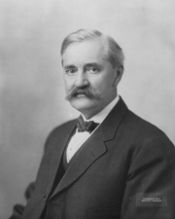 Albert B. Cummins Albert B. CumminsAlbert B. Cummins Albert Baird Cummins was the 18th Governor of Iowa, U.S. Senator and two-time presidential candidate. Cummins was perhaps the most influential leader in Iowa politics in the first quarter of the 20th century... |
Republican Republican Party (United States) The Republican Party is one of the two major contemporary political parties in the United States, along with the Democratic Party. Founded by anti-slavery expansion activists in 1854, it is often called the GOP . The party's platform generally reflects American conservatism in the U.S... |
November 24, 1908 – July 30, 1926 |
Appointed to finish Allison's term | |
| 12 | Elected to full term in 1908 United States Senate elections, 1908 Some states elected their Senators directly even before passage of the 17th Amendment in 1913. Oregon pioneered direct election and experimented with different measures over several years until it succeeded in 1907. Soon after, Nebraska followed suit and laid the foundation for other states to... |
||||
| 13 | Re-elected in 1914 | ||||
| 14 | Re-elected in 1920 Died, having lost renomination |
||||
| Vacant | July 30, 1926 – August 7, 1926 |
||||
| 7 | 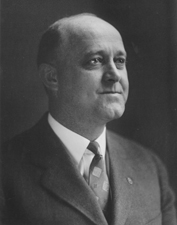 David W. Stewart David W. Stewart |
Republican Republican Party (United States) The Republican Party is one of the two major contemporary political parties in the United States, along with the Democratic Party. Founded by anti-slavery expansion activists in 1854, it is often called the GOP . The party's platform generally reflects American conservatism in the U.S... |
August 7, 1926 – March 4, 1927 |
Appointed to continue Cummins's term Elected to finish Cummins's term Retired |
|
| 8 |  Smith W. Brookhart Smith W. BrookhartSmith W. Brookhart Smith Wildman Brookhart , was twice elected as a Republican to represent Iowa in the United States Senate. He was considered an "insurgent" within the Republican Party; his criticisms of the Harding and Coolidge Administrations and of business interests alienated others within the Republican... |
Republican Republican Party (United States) The Republican Party is one of the two major contemporary political parties in the United States, along with the Democratic Party. Founded by anti-slavery expansion activists in 1854, it is often called the GOP . The party's platform generally reflects American conservatism in the U.S... |
March 4, 1927 – March 4, 1933 |
15 | Elected in 1926 Lost renomination and re-election as an Independent |
| 9 | 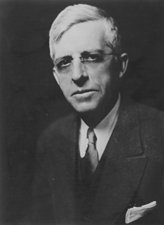 Richard L. Murphy Richard L. MurphyRichard L. Murphy Richard Louis Murphy of Dubuque, Iowa was a Democratic U.S. Senator from Iowa. Elected with President Franklin D... |
Democratic Democratic Party (United States) The Democratic Party is one of two major contemporary political parties in the United States, along with the Republican Party. The party's socially liberal and progressive platform is largely considered center-left in the U.S. political spectrum. The party has the lengthiest record of continuous... |
March 4, 1933 – July 16, 1936 |
16 | Elected in 1932 Died |
| Vacant | July 16, 1936 – November 3, 1936 |
||||
| 10 |  Guy Gillette Guy Gillette |
Democratic Democratic Party (United States) The Democratic Party is one of two major contemporary political parties in the United States, along with the Republican Party. The party's socially liberal and progressive platform is largely considered center-left in the U.S. political spectrum. The party has the lengthiest record of continuous... |
November 3, 1936 – January 3, 1945 |
17 | Elected to finish Murphy's term |
| 18 | Re-elected in 1938 Lost re-election |
||||
| 11 | Bourke B. Hickenlooper Bourke B. Hickenlooper Bourke Blakemore Hickenlooper , was a Republican politician from the US state of Iowa. He was lieutenant governor from 1939 to 1943 and then the 29th Governor of Iowa from 1943 to 1945... |
Republican Republican Party (United States) The Republican Party is one of the two major contemporary political parties in the United States, along with the Democratic Party. Founded by anti-slavery expansion activists in 1854, it is often called the GOP . The party's platform generally reflects American conservatism in the U.S... |
January 3, 1945 – January 3, 1969 |
19 | Retired |
| 12 |  Harold Hughes Harold HughesHarold Hughes Harold Everett Hughes was the 36th Governor of Iowa from 1963 until 1969; he had been a Republican earlier in his life. He also served as a Democratic United States Senator from 1969 until 1975.-Background:... |
Democratic Democratic Party (United States) The Democratic Party is one of two major contemporary political parties in the United States, along with the Republican Party. The party's socially liberal and progressive platform is largely considered center-left in the U.S. political spectrum. The party has the lengthiest record of continuous... |
January 3, 1969 – January 3, 1975 |
20 | Elected in 1968 Retired |
| 13 | John Culver John Culver John Chester Culver is an American politician of the Democratic Party who represented Iowa in both the United States House of Representatives and the United States Senate.... |
Democratic Democratic Party (United States) The Democratic Party is one of two major contemporary political parties in the United States, along with the Republican Party. The party's socially liberal and progressive platform is largely considered center-left in the U.S. political spectrum. The party has the lengthiest record of continuous... |
January 3, 1975 – January 3, 1981 |
21 | Elected in 1974 Lost re-election |
| 14 | Chuck Grassley Chuck Grassley Charles Ernest "Chuck" Grassley is the senior United States Senator from Iowa . A member of Republican Party, he previously served in the served in the United States House of Representatives and the Iowa state legislature... |
Republican Republican Party (United States) The Republican Party is one of the two major contemporary political parties in the United States, along with the Democratic Party. Founded by anti-slavery expansion activists in 1854, it is often called the GOP . The party's platform generally reflects American conservatism in the U.S... |
January 3, 1981 – Present |
22 | Elected in 1980 United States Senate election in Iowa, 1980 The 1980 United States Senate election in Iowa was held November 3, 1980. Incumbent Democratic U.S. Senator John Culver lost re-election to Republican Chuck Grassley.-Results:... |
| 23 | Re-elected in 1986 United States Senate election in Iowa, 1986 The 1986 United States Senate election in Iowa was held November 3, 1986. Incumbent Republican Chuck Grassley won re-election to a second term.-Results:... |
||||
| 24 | Re-elected in 1992 United States Senate election in Iowa, 1992 The 1992 United States Senate election in Iowa was held November 3, 1992. Incumbent Republican Chuck Grassley won re-election to a third term.-Results:... |
||||
| 25 | Re-elected in 1998 United States Senate election in Iowa, 1998 The 1998 United States Senate election in Iowa was held November 3, 1998. Incumbent Republican Chuck Grassley won re-election to a fourth term.-Results:... |
||||
| 26 | Re-elected in 2004 United States Senate election in Iowa, 2004 The 2004 United States Senate election in Iowa was held on November 2, 2004. Incumbent Republican U.S. Senator Chuck Grassley won re-election to a fifth term. His Democratic opponent topped 40% in just one county: Johnson County, Iowa.-Results:... |
||||
| 27 | Re-elected in 2010 United States Senate election in Iowa, 2010 The 2010 United States Senate election in Iowa took place on November 2, 2010, alongside other elections to the United States Senate in other states as well as elections to the United States House of Representatives and various state and local elections in Iowa. The party primary elections were... |
||||
| # | Senator | Party | Years | Term | Electoral history |
See also
- List of United States Representatives from Iowa
- United States congressional delegations from IowaUnited States Congressional Delegations from IowaThese are tables of congressional delegations from Iowa to the United States Senate and United States House of Representatives.-United States Senate:...

